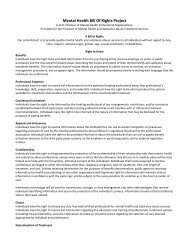2008 Ohio Psychologist - Ohio Psychological Association
2008 Ohio Psychologist - Ohio Psychological Association
2008 Ohio Psychologist - Ohio Psychological Association
Create successful ePaper yourself
Turn your PDF publications into a flip-book with our unique Google optimized e-Paper software.
ecological models, risk and resilience models; see Boyer, <strong>2008</strong><br />
for a review of integrative models).<br />
Disenfranchising Oppressed Groups<br />
Members of oppressed groups (e.g., racial/ethnic/cultural<br />
minorities, women, disabled, elderly, etc.) have a significant<br />
number of environmental factors that impact their emotional<br />
well-being. Medicalizing mental health care has not<br />
significantly improved the care for many of these groups<br />
in the U.S., and in fact, ignoring the impact of inequitable<br />
social realities for clients creates unethical care (Aldarondo,<br />
2007; Hansen, 2006). Physicians often tend to overlook the<br />
social realities that may impact their patients’ mood, focusing<br />
rather on biology and medication (Thomas-MacLean &<br />
Stoppard, 2004). However, pills will not cure the emotional<br />
effect of racism, sexism, ageism, poverty or oppression on<br />
individuals. Research demonstrates that when individuals<br />
fulfill their personal, relational, and collective needs, they<br />
experience wellness within their social context (Prilleltensky,<br />
Dokecki, Frieden, & Wang, 2007). This model is a better fit<br />
for individuals of diverse groups, is clearly broader than just<br />
biology or western medicine, and taps into the ability of<br />
individuals to overcome oppression and discrimination in an<br />
unjust society (Prilleltensky et al., 2007).<br />
Reducing the Power to Change<br />
It is likely that when an individual is told that their mental<br />
health is biologically based, it may disempower them to<br />
change their behaviors. Western medicine, focused on the<br />
illness-based model of treatment, advocates for a passive role<br />
for the patient (or client). In these models of treatment, the<br />
mind is separated from the body, and somatic symptoms (as<br />
well as somatic treatment) are seen as more valid or desirable<br />
because they are treatable within the medical context<br />
(Thomas-MacLean & Stoppard, 2004). Therefore, the patient<br />
can only take control of their “illness” by taking medication<br />
that changes internal biochemistry, rather than modifying<br />
unhealthy behaviors or changing negative beliefs that<br />
contribute to mental health problems.<br />
When Biologizing Mental Illness is a Positive<br />
There are positive aspects to medicalizing mental<br />
health problems and identifying the biological<br />
bases underlying certain disorders. Naming<br />
something can increase a client’s power over the<br />
situation, as well as validate their experience. For<br />
example, research indicates that when depression<br />
and other mental illnesses are given a diagnosis,<br />
it validates the experience of the individual with<br />
depression and can be a source of relief that<br />
it is not “all in their head” (LaFrance, 2007).<br />
Further, some disorders have significant evidence<br />
of strong biological bases and respond well<br />
to medications—schizophrenia, for example.<br />
Ultimately, however, there are numerous mental<br />
health conditions such as PTSD, that, despite<br />
having biological and somatic symptoms, are<br />
psychologically-based disorders. Generally,<br />
mental health and physical well-being are not exclusive, but<br />
rather intertwined domains, and the fields of positive and<br />
integrative psychology clearly demonstrate that the mind can<br />
impact the body, and vice versa (e.g., Seligman, Steen, Park,<br />
& Peterson, 2005; Surtees, Wainwright, Luben, Wareham,<br />
Bingham, & Khaw, <strong>2008</strong>).<br />
We should clarify that we are not against the use of<br />
medication when necessary. What we are against is the<br />
medical model of pill-pushing cure all. In general, it<br />
appears that medication treats symptoms and not the<br />
problem. ”Biologizing” mental health assumes a pill will<br />
cure everything and that psychotherapy would not help.<br />
Unfortunately, psychologists are trying to get validation by<br />
the medical profession and insurance companies to be seen as<br />
“real” doctors, when our true agenda should be getting people<br />
to recognize that they do have the strength to overcome<br />
illness without always deferring to medical opinions. Take<br />
obesity, for example. Although genetics are linked with being<br />
overweight; if obesity were 100% heritable, bariatric surgery<br />
would not work. Taking a pill is easier/faster than exercising<br />
and eating healthy. In our McSociety, this “quick fix” is seen<br />
as more convenient and more useful than the alternative.<br />
There is little doubt that the pharmaceutical industry has had<br />
an influence on treatment philosophy, strategy and approach<br />
and emphasized the biologically based illness/disease model<br />
(Metzl, 2003; Moynihan, Heath, & Henry, 2002; Special<br />
Section, 2006). Medication sells by selling sickness. If it<br />
is a chemical imbalance, then what biochemical level of<br />
neurotransmitter is a normal level The answer is that we do<br />
not know.<br />
Critics may raise the gene issue as supporting the underlying<br />
cause of the imbalanced biology. Yet researchers describe this<br />
relationship as genes being the switch, and the environment<br />
and the response to it determines if the switch is turned on or<br />
off (Roizen, 2004). For example, one could make a rat either<br />
anxious or not anxious by whether or not we lick it when<br />
THE OHIO PSYCHOLOGIST AUGUST <strong>2008</strong> 26











